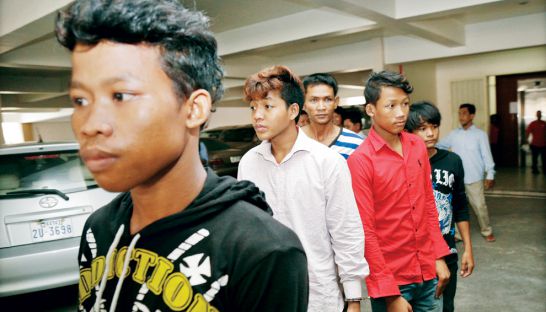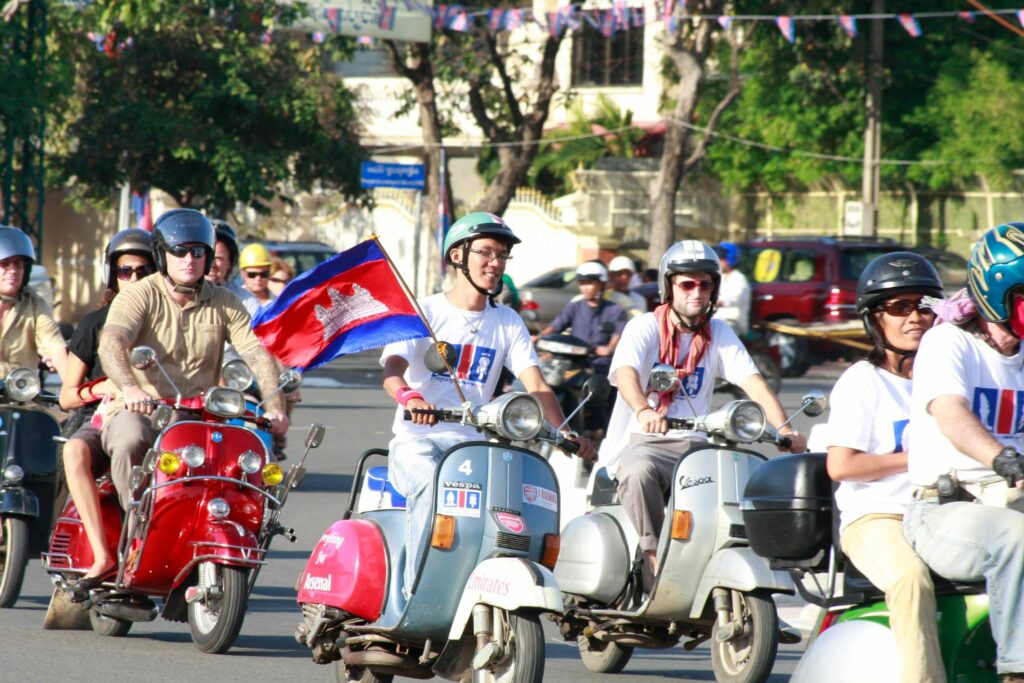Unofficial Translation from The Phnom Penh Post’s Khmer edition
TUESDAY, 18 AUGUST 2015,
TONG SOPRACH
យុវជនក្លាយជាឃាតករមួយប៉ប្រិចភ្នែកដោយសាររំលោភបូក

In recent years, the phrases ‘york srey tov bauk’ and ‘bauk srey,’ known in English as ‘gang rape’ have become commonly used among young males, although rarely out in the open. Referred to colloquially as ‘bauk srey’ or simply ‘bauk’ (Khmer for ‘plus’), gang rape is especially perpetrated by young men who buy sex.
Bauk in general terms:
1. Bauk generally occurs after one (or two) youth(s) negotiate a price with a sex worker, or solicit a woman’s affection and arrange a proposed destination for sexual intercourse.
2. The woman is then taken to a hotel or guest-house, where numerous other young men are waiting, or will soon arrive.
3. The youths coerce the woman into having sex with all of them without consent, often accompanied by violence. Almost all of the young men say that it is not rape because they have already paid for sex. (Wilkinson, 2002), (Bearup, 2003), and (Soprach, 2004)
This form of rape has become increasingly brutal, to the point that it has led to the murder of some victims; usually sex workers or women working in entertainment services. Frequently, these young men claim they did not originally intend to kill the victims, but decided to after becoming afraid that the victims would complain to police after being raped.
Last month, a woman entertainment worker was brutally raped (bauk) and killed, and her body was left naked somewhere near Ang Ta Minh Pagoda, located in Po Senchey District, Phnom Penh. In another case, six young male perpetrators were arrested and charged with rape and homicide after confessing to gang raping and then killing a sex worker.
In an article published by the Phnom Penh Post’s Khmer Edition in relation to the case, the police commissioner of Po Senchey district stated that based on the confession of the six accused, two of them went to negotiate and bring the entertainment worker to nearby Bopha restaurant, Ta Ngun village, Sankat Kakab around 8-9pm. She agreed each of them would pay 10 dollars. Yet, after she had sex with both of them, four other young men turned up and raped her. Afterward, the victim argued with the group of men, demanding that they pay her and warning that she would go to the police. They strangled her to death before transporting her body on a motorbike and dropping it somewhere near Ang Ta Minh Pagoda.
The crime of bauk is not perpetrated solely against entertainment workers. Last week, a 13 year old girl living in Sihanouk province was gang raped (bauk) by six men, whom she had known via Facebook. So far, five of them have been arrested and sent to the court. And another case of gang rape (bauk) of 16-year-old girl happened in Kandal province this week.
A recent report from human rights organisation ADHOC, claims that their NGO has received accounts of six cases of gang rape in the past six months. However, the majority of women working in the sex industry do not dare to report gang-rapes because they are also afraid of the police officers who may accuse of them engaging in illegal prostitution (despite the law not actually specifying that selling sex is illegal in Cambodia). Whereas those woman victims only described and complained their pains by bauk activity.
A 2006 CARE report stated that “Gang-rape, or bauk, often of sex workers, is widely recognized as a recreational sex activity among male youth particularly in urban areas.” In the last five years, the rate of gang-rape bauk appears to have remains unchanged at around 10 percent of among young males being perpetrators, based on the findings of two separate studies (10.8 {020613e3781e757fa5d0c4ea8d2e9a1eda2b430a524642dc0ce5b56489f01aa8} in 2009 and 10.6 {020613e3781e757fa5d0c4ea8d2e9a1eda2b430a524642dc0ce5b56489f01aa8} in 2014). (Soprach, 2009 & 2014)
When news broke from India about the horrific gang rape and murder of a young woman, it was condemned by the government and was cause for global outcry. But when incidents like this occur with alarming frequency in Cambodia, this violence has somehow become normalised to the point that it garners very little reaction at all. This poses the following questions: Why the lack of widespread protests such as those seen in India? When will bauk be eliminated from Cambodia? What can young men and women do to assist in the prevention and elimination of sexual violence?
If we look at the policy on National Youth and Development, and the National Councils on Youths and Development which lead by senior government officials, it seems that not much has yet been achieved by way of implementation.
The Ministry of Education, Youths, and Sports is successfully making strides in the education sector, however it has not yet indicated any success in terms of youth development. This poses the question of whether a new establishment should be established to work with youth?
Meanwhile, the Ministry of Woman Affairs has developed rigorous and sound strategic plans and policies to promote the rights of women, in particular the recent National Action Plan for the Prevention of Violence Against Women (NAPVAW, 2014-2018), which ostensibly includes the use of media to communicate messages to the Cambodian public relating to gender equality, and the eradication of violence against women.
These messages could be in the form of short public service announcement videos or via other types of communication channels. But, it appears that things are completely different in reality. Such messages are rarely seen, while the TV’s broadcasting hours saved for advertising seem primarily occupied by the ads for alcohols brands (ironically, products that indirectly fuel sexual violence).
This poses the question: Is this because the Ministry of Woman Affairs lacks sufficient budget for impactful advertising? Or does want to propose the gender budget to donor and government to facilitate the combat against such crimes against women?
Based on experience in previous years, there have been several NGOs working with youth, such as CARE, KYA, PHD, Safe Cities for Women and so on to change young men’s attitudes and behaviours towards women, including efforts towards stopping the gang rape bauk, which is a crime against humanity, while the victims could ultimately be anyone, including their mothers, sisters, and friends. How would they feel if it were to happen to the ones they love?
Along with these efforts from NGOs and campaigning groups, perhaps men should be encouraged to masturbate, which is natural, has no side effect, and also to prevent the transmission of HIV/AIDS and can also reduce rates of sexual violence against women.
Tong Soprach is a social-affairs columnist for the Post’s Khmer edition.
Comments: [email protected]
